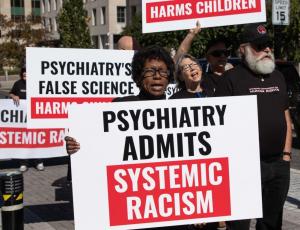Psychiatrists are faulted for knowing the theory of a chemical imbalance of the brain was unproven, but failed to correct the misconception.
Mental health activists marched Friday to the downtown DC location of a conference held by the American Psychiatric Association (APA) to protest psychiatry’s systemic racism and failure to follow the scientific research which shows there is no proof of a chemical imbalance of the brain. The DC chapter of the Citizens Commission on Human Rights (CCHR), a mental health watchdog organization, organized the protest.
In 2021, the APA publicly admitted “enabling discriminatory and prejudicial actions within the APA and racist practices in psychiatric treatment for Black, Indigenous and People of Color (BIPOC).”
“Since the APA’s inception, practitioners have at times subjected persons of African descent and Indigenous people who suffered from mental illness to abusive treatment, experimentation, victimization in the name of ‘scientific evidence,’ along with racialized theories that attempted to confirm their deficit status,” the APA admitted.
“These appalling past actions, as well as their harmful effects, are ingrained in the structure of psychiatric practice and continue to harm BIPOC psychological well-being even today,” the APA continued.

As evidence of psychiatric racism, African Americans are disproportionately diagnosed with mental illness and disproportionately committed to psychiatric facilities. They are more likely to be labeled with conduct disorder and psychotic disorders, especially schizophrenia, and overly prescribed antipsychotic drugs. African American children are disproportionately labeled with ADHD.
The theory of a chemical imbalance in the brain causing mental disorders has been widely promoted as a rationale for prescribing psychiatric drugs to millions of Americans, even though decades of intensive research up to present day have failed to find proof of the assertion.
In the most recent study debunking the theory, researchers led by Joanna Moncrieff, a psychiatrist and professor at University College London, conducted a comprehensive review, which for the first time integrated all relevant research, to evaluate whether scientific evidence supported the serotonin theory of depression.
Their conclusion, published in Molecular Psychiatry, states: “Our comprehensive review of the major strands of research on serotonin shows there is no convincing evidence that depression is associated with, or caused by, lower serotonin concentrations or activity.”

Surveys have found that 85% to 90% of the public believe that a chemical imbalance causes depression and that antidepressants fix it. The researchers expressed concern that the general public’s acceptance of the chemical imbalance theory of depression has had the adverse effect of causing depressed individuals to believe they have less control over their moods, leading them “to a pessimistic outlook on the outcome of depression and negative expectancies about the possibility of self-regulation of mood.”
A study of influential psychiatric and psychopharmacological literature over the 20-year period starting in 1990, when the chemical imbalance theory was first popularized, found that the psychiatric profession endorsed the theory and bears responsibility for its spread and the mass prescribing of psychiatric drugs it has inspired. Some 77 million Americans currently take psychiatric drugs.
“Psychiatrists knew this biological assertion was unproven, but they failed to correct the widespread misconception.”
– Anne Goedeke, Citizens Commission on Human Rights National Affairs Office
The APA website continues to stick with the chemical imbalance theory and to promote antidepressants to “help modify one’s brain chemistry.”
“The APA’s next apology should be to the tens of millions of Americans needlessly taking antidepressants and other psychiatric drugs to fix a chemical imbalance that doesn’t exist,” said Anne Goedeke, president of the Citizens Commission on Human Rights National Affairs Office. “Psychiatrists knew this biological assertion was unproven, but they failed to correct the widespread misconception.”
The Citizens Commission on Human Rights continues to raise public awareness on the lack of scientific proof of the chemical imbalance theory and the known harms of antidepressants and other psychiatric drugs, so that consumers and their physicians can make fully informed decisions about starting and stopping the drugs.
CCHR also recommends a complete physical examination with lab tests, nutritional and allergy screenings, and a review of all current medication to identify any physical causes of depression or other unwanted mental and emotional symptoms.
WARNING: Anyone wishing to discontinue or change the dose of an antidepressant or other behavioral drug is cautioned to do so only under the supervision of a physician because of potentially dangerous withdrawal symptoms.
